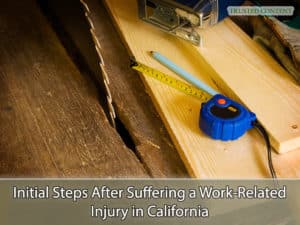Fighting for Your Denied Workers’ Compensation Claim in California
California's workers' compensation system offers a lifeline to employees who suffer from work-related injuries or illnesses. This no-fault system is designed to ensure that injured workers receive medical care and compensation for lost wages, regardless of who was at fault for the injury. The goal is to provide swift and fair compensation to help workers recover and return to work. However, the process is not always straightforward, and workers may find their claims denied for various reasons. When a claim is denied, the worker faces the daunting task of navigating through an appeals process that can be complex and confusing. Understanding the basics of the workers' compensation system and the reasons claims can be denied is the first step in effectively fighting for your rights.

Initial Steps After Suffering a Work-Related Injury in California
Initial Steps After Suffering a Work-Related Injury in California
The immediate actions taken after sustaining a work-related injury are crucial for the success of a workers' compensation claim. First and foremost, seeking medical attention not only ensures your well-being but also establishes a record of the injury and its severity. It's important to inform your healthcare provider that the injury is work-related so that it is documented from the start. Promptly reporting the injury to your employer is equally critical, as failing to do so within the stipulated time frame can jeopardize your claim. California law mandates that injuries must be reported within 30 days, but sooner is always better. Detailed documentation and adherence to these initial steps lay the groundwork for a strong workers' compensation claim.
Completing and Filing Your DWC-1 Claim Form
After notifying your employer of your injury, you will be provided with a DWC-1 Claim Form. This form is your formal request for workers' compensation benefits and must be filled out with care and precision. Accurately completing this form is essential, as any discrepancies or omissions can lead to delays or denials of your claim. It is advisable to review the form with a workers' compensation attorney, who can ensure that all necessary information is included and that your rights are protected. Submitting this form to your employer kickstarts the official claims process, marking the beginning of your journey toward securing the benefits you deserve.

Common Reasons for Workers' Compensation Claim Denials
Common Reasons for Workers' Compensation Claim Denials
Workers' compensation claims in California can be denied for a multitude of reasons. Common grounds for denial include disputes over whether the injury occurred at work or was related to work activities, missed deadlines for reporting the injury or filing the claim, insufficient medical evidence to support the claim, or inconsistencies in the injury report. Understanding the specific reason for your claim's denial is crucial for formulating an effective appeal. Each denial reason requires a tailored approach in the appeals process, highlighting the importance of a detailed and strategic response. Engaging with a knowledgeable workers' compensation attorney can provide insight into the denial and help develop a plan to address the issues raised by the insurance company or employer.
Navigating the Appeals Process
The appeals process for a denied workers' compensation claim in California involves several key steps. The first step is to file an Application for Adjudication of Claim with the Workers' Compensation Appeals Board (WCAB) in the appropriate jurisdiction. This application is the formal beginning of your appeal, and it establishes a case within the WCAB system. Following this, a hearing may be scheduled, where you will have the opportunity to present evidence and argue your case before a judge. Preparing for this hearing involves gathering all relevant medical records, any witness statements, and other evidence that supports your claim. It's a critical phase where the strength of your case is built, requiring thorough preparation and attention to detail. The complexity of this process underscores the value of experienced legal representation to navigate the legal challenges and advocate on your behalf.
The Hearing and Beyond
The hearing before a workers' compensation judge is a pivotal moment in the appeals process. This is your opportunity to present your case, including evidence of the injury, its impact on your life, and any disputes regarding the denial of your claim. The judge will review the evidence, listen to testimonies, and make a decision based on the merits of the case. If the decision is favorable, you will be awarded the benefits previously denied. However, if the decision is not in your favor, you have the option to appeal to a higher level within the WCAB. This next level of appeal involves a more detailed review of your case and requires a compelling argument to overturn the initial decision. Success at any stage of the appeals process can significantly impact your recovery and financial well-being, making it essential to approach each step with diligence and determination.

Fighting for Your Denied Workers' Compensation Claim in California
Fighting for Your Denied Workers' Compensation Claim in California
Facing a denied workers' compensation claim can be a challenging and stressful experience, but it's important to remember that you have options and rights under California law. Armed with knowledge and the right support, you can navigate the appeals process and fight for the benefits you deserve. The importance of seeking experienced legal assistance cannot be overstated, as it can make a significant difference in the outcome of your case. If you're dealing with a denied workers' compensation claim, don't hesitate to seek professional help. Contact Napolin Accident Injury Lawyer at (866)-NAPOLIN for a free consultation. Our team is dedicated to advocating for the rights of injured workers across California, providing the expertise and support needed to navigate your claim and secure the compensation you're entitled to.
- Safely and Legally Navigating Parking Lots in California - July 15, 2024
- Navigating the Aftermath of a Highway Auto Accident in California - July 15, 2024
- An Overview of California's Commercial Truck Insurance Laws - July 15, 2024
